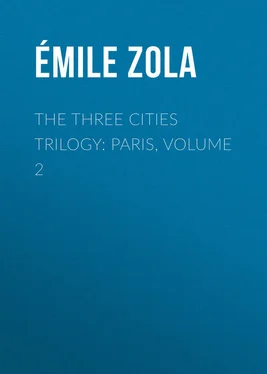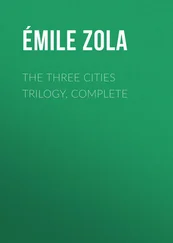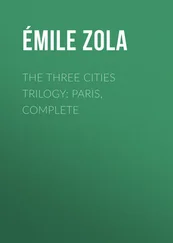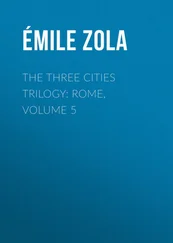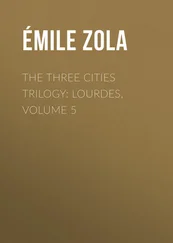Émile Zola - The Three Cities Trilogy - Paris, Volume 2
Здесь есть возможность читать онлайн «Émile Zola - The Three Cities Trilogy - Paris, Volume 2» — ознакомительный отрывок электронной книги совершенно бесплатно, а после прочтения отрывка купить полную версию. В некоторых случаях можно слушать аудио, скачать через торрент в формате fb2 и присутствует краткое содержание. Жанр: literature_19, foreign_antique, foreign_prose, на английском языке. Описание произведения, (предисловие) а так же отзывы посетителей доступны на портале библиотеки ЛибКат.
- Название:The Three Cities Trilogy: Paris, Volume 2
- Автор:
- Жанр:
- Год:неизвестен
- ISBN:нет данных
- Рейтинг книги:4 / 5. Голосов: 1
-
Избранное:Добавить в избранное
- Отзывы:
-
Ваша оценка:
- 80
- 1
- 2
- 3
- 4
- 5
The Three Cities Trilogy: Paris, Volume 2: краткое содержание, описание и аннотация
Предлагаем к чтению аннотацию, описание, краткое содержание или предисловие (зависит от того, что написал сам автор книги «The Three Cities Trilogy: Paris, Volume 2»). Если вы не нашли необходимую информацию о книге — напишите в комментариях, мы постараемся отыскать её.
The Three Cities Trilogy: Paris, Volume 2 — читать онлайн ознакомительный отрывок
Ниже представлен текст книги, разбитый по страницам. Система сохранения места последней прочитанной страницы, позволяет с удобством читать онлайн бесплатно книгу «The Three Cities Trilogy: Paris, Volume 2», без необходимости каждый раз заново искать на чём Вы остановились. Поставьте закладку, и сможете в любой момент перейти на страницу, на которой закончили чтение.
Интервал:
Закладка:
So saying, he waved his hand as if to indicate how broadly tolerant and free from error and superstition was that lofty sovereign mind of his, which in spite of all the orders that bedizened him, in spite of all the academical titles that he bore as an official savant , made him a man of the boldest and most independent views, one whose only passion was truth, as he himself said.
He lacked the necessary appliances to do more than dress the wound, after making sure that no fragment of any projectile had remained in the flesh. Then he at last went off, promising to return at an early hour on the morrow; and, as the priest escorted him to the street door, he spoke some comforting words: if the bone had not been deeply injured all would be well.
On returning to the bedside, Pierre found his brother still sitting up and seeking fresh energy in his desire to write home and tranquillise his loved ones. So the priest, after providing pen and paper, again had to take up the lamp and light him. Guillaume fortunately retained full use of his right hand, and was thus able to pen a few lines to say that he would not be home that night. He addressed the note to Madame Leroi, the mother of his deceased mistress, who, since the latter's death, had remained with him and had reared his three sons. Pierre was aware also that the household at Montmartre included a young woman of five or six and twenty, the daughter of an old friend, to whom Guillaume had given shelter on her father's death, and whom he was soon to marry, in spite of the great difference in their ages. For the priest, however, all these were vague, disturbing things, condemnable features of disorderly life, and he had invariably pretended to be ignorant of them.
"So you wish this note to be taken to Montmartre at once?" he said to his brother.
"Yes, at once. It is scarcely more than seven o'clock now, and it will be there by eight. And you will choose a reliable man, won't you?"
"The best course will be for Sophie to take a cab. We need have no fear with her. She won't chatter. Wait a moment, and I will settle everything."
Sophie, on being summoned, at once understood what was wanted of her, and promised to say, in reply to any questions, that M. Guillaume had come to spend the night at his brother's, for reasons which she did not know. And without indulging in any reflections herself, she left the house, saying simply: "Monsieur l'Abbe's dinner is ready; he will only have to take the broth and the stew off the stove."
However, when Pierre this time returned to the bedside to sit down there, he found that Guillaume had fallen back with his head resting on both pillows. And he looked very weary and pale, and showed signs of fever. The lamp, standing on a corner of a side table, cast a soft light around, and so deep was the quietude that the big clock in the adjoining dining-room could be heard ticking. For a moment the silence continued around the two brothers, who, after so many years of separation, were at last re-united and alone together. Then the injured man brought his right hand to the edge of the sheet, and the priest grasped it, pressed it tenderly in his own. And the clasp was a long one, those two brotherly hands remaining locked, one in the other.
"My poor little Pierre," Guillaume faintly murmured, "you must forgive me for falling on you in this fashion. I've invaded the house and taken your bed, and I'm preventing you from dining."
"Don't talk, don't tire yourself any more," interrupted Pierre. "Is not this the right place for you when you are in trouble?"
A warmer pressure came from Guillaume's feverish hand, and tears gathered in his eyes. "Thanks, my little Pierre. I've found you again, and you are as gentle and loving as you always were. Ah! you cannot know how delightful it seems to me."
Then the priest's eyes also were dimmed by tears. Amidst the deep quietude, the great sense of comfort which had followed their violent emotion, the brothers found an infinite charm in being together once more in the home of their childhood. 1 1 See M. Zola's "Lourdes," Day I., Chapter II.
It was there that both their father and mother had died – the father tragically, struck down by an explosion in his laboratory; the mother piously, like a very saint. It was there, too, in that same bed, that Guillaume had nursed Pierre, when, after their mother's death, the latter had nearly died; and it was there now that Pierre in his turn was nursing Guillaume. All helped to bow them down and fill them with emotion: the strange circumstances of their meeting, the frightful catastrophe which had caused them such a shock, the mysteriousness of the things which remained unexplained between them. And now that after so long a separation they were tragically brought together again, they both felt their memory awaking. The old house spoke to them of their childhood, of their parents dead and gone, of the far-away days when they had loved and suffered there. Beneath the window lay the garden, now icy cold, which once, under the sunbeams, had re-echoed with their play. On the left was the laboratory, the spacious room where their father had taught them to read. On the right, in the dining-room, they could picture their mother cutting bread and butter for them, and looking so gentle with her big, despairing eyes – those of a believer mated to an infidel. And the feeling that they were now alone in that home, and the pale, sleepy gleam of the lamp, and the deep silence of the garden and the house, and the very past itself, all filled them with the softest of emotion blended with the keenest bitterness.
They would have liked to talk and unbosom themselves. But what could they say to one another? Although their hands remained so tightly clasped, did not the most impassable of chasms separate them? In any case, they thought so. Guillaume was convinced that Pierre was a saint, a priest of the most robust faith, without a doubt, without aught in common with himself, whether in the sphere of ideas or in that of practical life. A hatchet-stroke had parted them, and each lived in a different world. And in the same way Pierre pictured Guillaume as one who had lost caste, whose conduct was most suspicious, who had never even married the mother of his three children, but was on the point of marrying that girl who was far too young for him, and who had come nobody knew whence. In him, moreover, were blended the passionate ideas of a savant and a revolutionist, ideas in which one found negation of everything, acceptance and possibly provocation of the worst forms of violence, with a glimpse of the vague monster of Anarchism underlying all. And so, on what basis could there be any understanding between them, since each retained his prejudices against the other, and saw him on the opposite side of the chasm, without possibility of any plank being thrown across it to enable them to unite? Thus, all alone in that room, their poor hearts bled with distracted brotherly love.
Pierre knew that, on a previous occasion, Guillaume had narrowly escaped being compromised in an Anarchist affair. He asked him no questions, but he could not help reflecting that he would not have hidden himself in this fashion had he not feared arrest for complicity. Complicity with Salvat? Was he really an accomplice? Pierre shuddered, for the only materials on which he could found a contrary opinion were, on one hand, the words that had escaped his brother after the crime, the cry he had raised accusing Salvat of having stolen a cartridge from him; and, on the other hand, his heroic rush into the doorway of the Duvillard mansion in order to extinguish the match. A great deal still remained obscure; but if a cartridge of that frightful explosive had been stolen from Guillaume the fact must be that he manufactured such cartridges and had others at home. Of course, even if he were not an accomplice, the injury to his wrist had made it needful for him to disappear. Given his bleeding hand, and the previous suspicions levelled against him, he would never have convinced anybody of his innocence. And yet, even allowing for these surmises, the affair remained wrapt in darkness: a crime on Guillaume's part seemed a possibility, and to Pierre it was all dreadful to think of.
Читать дальшеИнтервал:
Закладка:
Похожие книги на «The Three Cities Trilogy: Paris, Volume 2»
Представляем Вашему вниманию похожие книги на «The Three Cities Trilogy: Paris, Volume 2» списком для выбора. Мы отобрали схожую по названию и смыслу литературу в надежде предоставить читателям больше вариантов отыскать новые, интересные, ещё непрочитанные произведения.
Обсуждение, отзывы о книге «The Three Cities Trilogy: Paris, Volume 2» и просто собственные мнения читателей. Оставьте ваши комментарии, напишите, что Вы думаете о произведении, его смысле или главных героях. Укажите что конкретно понравилось, а что нет, и почему Вы так считаете.
